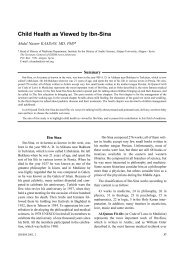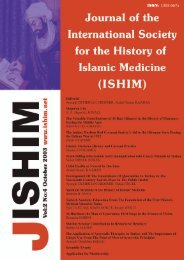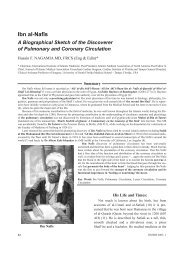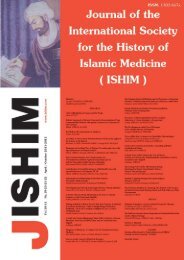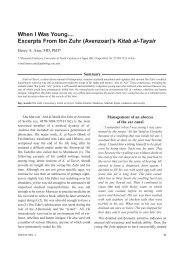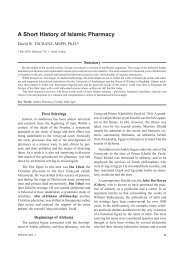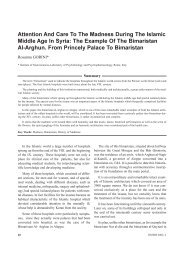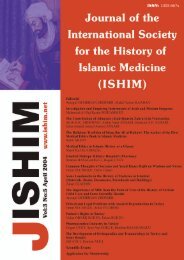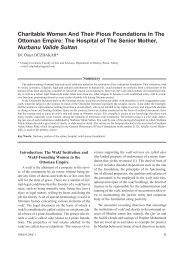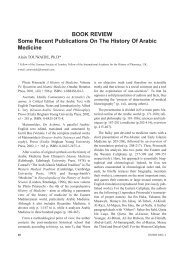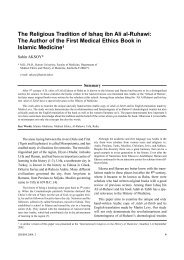Ethical and Legal Problems with Assisted Reproduction in Turkey
Ethical and Legal Problems with Assisted Reproduction in Turkey
Ethical and Legal Problems with Assisted Reproduction in Turkey
You also want an ePaper? Increase the reach of your titles
YUMPU automatically turns print PDFs into web optimized ePapers that Google loves.
<strong>Ethical</strong> <strong>and</strong> <strong>Legal</strong> <strong>Problems</strong> <strong>with</strong> <strong>Assisted</strong><br />
<strong>Reproduction</strong> <strong>in</strong> <strong>Turkey</strong><br />
Omür ELCIOGLU*, Atilla YILDIRIM**<br />
* Ph.D., Assistant Professor. Osmangazi University School of<br />
Medic<strong>in</strong>e Department of Medical Ethics, Eskiþehir-<strong>Turkey</strong>.<br />
** M.D., Professor. Osmangazi University School of<br />
Medic<strong>in</strong>e Department of Obstetric <strong>and</strong> Gynecology, Eskiþehir-<strong>Turkey</strong>.<br />
e-mail: elcioglu@ogu.edu.tr<br />
Summary<br />
In vitro fertilization (IVF) <strong>and</strong> embryo transfer (ET) studies <strong>in</strong> <strong>Turkey</strong> are be<strong>in</strong>g carried out by the units of certa<strong>in</strong> university <strong>and</strong><br />
private gynecology cl<strong>in</strong>ics <strong>in</strong> some prov<strong>in</strong>ces.<br />
Embryos developed <strong>in</strong> vitro <strong>in</strong> labs can be transferred <strong>in</strong>to uterus pr, if it is not realized, can go on develop<strong>in</strong>g <strong>in</strong> vitro, can be used<br />
for research purposes, discharged like aborted through <strong>in</strong>duced abortions or kept frozen for use later. All these applications have<br />
important medical, legal <strong>and</strong> ethical problems <strong>in</strong> them.<br />
The aim of this study is ethical evaluation of related legislation <strong>in</strong> <strong>Turkey</strong>. The first legal regulation concern<strong>in</strong>g assisted reproduction<br />
is title ” Regulation on In Vitro Fertilization <strong>and</strong> Embryo Transfer Centers “ is dated 21.08.1987. Certa<strong>in</strong> amendment have been<br />
made s<strong>in</strong>ce than.<br />
Accord<strong>in</strong>g to regulation a couple’s consent is a prerequisite for them to be admitted to treatment us<strong>in</strong>g assisted reproductive techniques<br />
(ART’s). Heterological fecundation <strong>and</strong> embryo research are forbidden .<br />
In order to keep up <strong>with</strong> such rapid advances <strong>in</strong> medical science <strong>and</strong> to get the expected benefits, further discussion <strong>in</strong> this area<br />
are needed.<br />
Key Words; In Vitro Fertilization, Embryo Transfer, <strong>Legal</strong> <strong>and</strong> <strong>Ethical</strong> <strong>Problems</strong>, <strong>Turkey</strong>.<br />
Introduction<br />
Infertility necessarily means childlessness, not all<br />
childless states (voluntary or <strong>in</strong>voluntary)equate <strong>with</strong><br />
the medical disability of <strong>in</strong>fertility. Some people<br />
would like to have <strong>and</strong> care for a child, but for many<br />
reasons, <strong>in</strong>clud<strong>in</strong>g personal circumstances, can not.<br />
Reproductive medic<strong>in</strong>e is technologically powerful<br />
but cl<strong>in</strong>ically <strong>and</strong> socially complex. Medical management<br />
aims to prevent or cure physiologically or pathologically<br />
abnormal states <strong>and</strong> thereby to m<strong>in</strong>imize the<br />
suffer<strong>in</strong>g that disease <strong>and</strong> disability cause (1).<br />
Def<strong>in</strong>ed by the World Health Organization as a<br />
complete state of physical <strong>and</strong> mental well be<strong>in</strong>g,<br />
health is understood as be<strong>in</strong>g more than the absence of<br />
disease; It <strong>in</strong>cludes the harmonious development of<br />
the human person. Infertility <strong>in</strong> its classic sense refers<br />
to the impossibility of reproduction <strong>in</strong> spite of unprotected<br />
sexual relations dur<strong>in</strong>g a period of 1-2 years.<br />
This <strong>in</strong>fertility affects the person mentally <strong>and</strong> physically<br />
<strong>and</strong> constitutes a medical <strong>in</strong>dication allow<strong>in</strong>g<br />
resource to assisted reproductive technologies.<br />
This is the approach of most of the countries that<br />
have legislated or provided recommendations on this<br />
question (2).<br />
<strong>Assisted</strong> reproductive technologies (ARTs)can be<br />
very helpful for certa<strong>in</strong> patients, but concerns have<br />
been raised about the <strong>in</strong>herent nature of specific techniques<br />
<strong>and</strong> context <strong>in</strong> which many techniques are<br />
used. ARTs are unique among medical procedures<br />
because they aim specifically to create new <strong>in</strong>dividuals<br />
<strong>and</strong> family relationships. The ethics of ARTs must<br />
be understood <strong>with</strong><strong>in</strong> this social context which is<br />
often characterized by conflicts among compet<strong>in</strong>g<br />
<strong>in</strong>terests. Physicians play important roles <strong>in</strong> support-<br />
JISHIM 2004, 3<br />
33
Omür ELCIOGLU, Atilla YILDIRIM<br />
<strong>in</strong>g those who wish to become parents <strong>and</strong> <strong>in</strong> educat<strong>in</strong>g<br />
patients about impediments to fertilization <strong>and</strong><br />
ways to promote conception (3).<br />
We want to expla<strong>in</strong> various ethical issues surround<strong>in</strong>g<br />
ARTs, family relationship, <strong>in</strong>formed choice,<br />
embryo status, legal <strong>and</strong> policy issues.<br />
In Vitro Fertilization <strong>and</strong> Embryo<br />
Transfer <strong>in</strong> <strong>Turkey</strong><br />
In vitro fertilization (IVF) <strong>and</strong> embryo transfers<br />
(ET)may be carried out <strong>in</strong> <strong>Turkey</strong> on conditions stated<br />
<strong>in</strong> the “By -law Concern<strong>in</strong>g Treatment Centers<br />
for <strong>Assisted</strong> Procreation “of 19 November 1996.<br />
In <strong>Turkey</strong> the first regulation on medically assisted<br />
procreation was the “By-law on Centers for <strong>in</strong><br />
vitro Fertilization <strong>and</strong> Embryo Transfer” that was<br />
issued on 21 August 1987 <strong>in</strong> accordance <strong>with</strong> the<br />
“Governmental Decree No:181 <strong>with</strong> Hav<strong>in</strong>g the<br />
Power of Law on Organization <strong>and</strong> Functions of the<br />
M<strong>in</strong>istry of Health <strong>and</strong> Social Assistance” of 13<br />
December 1983 (Thereafter KHK/181). It was<br />
amended, later by the by-law dated 19 November<br />
1996 (<strong>in</strong> Official Gazette, no. 22822 of 19 November<br />
1996). The new by-law has renamed several concepts<br />
relat<strong>in</strong>g to IVF <strong>and</strong> ET. The new By-Law has named<br />
the concept of <strong>in</strong> vitro fertilization (IVF) <strong>and</strong> embryo<br />
transfer (ET) as “Methods for <strong>Assisted</strong> Procreation<br />
(MAP)”. Moreover, the head<strong>in</strong>g of the by-law of 21<br />
August 1987 was changed as “By -Law Concern<strong>in</strong>g<br />
Treatment Centers for <strong>Assisted</strong> Procreation”.<br />
Under by-law, treatment methods for assist<strong>in</strong>g<br />
reproduction (TMAR) mean practices admitted as<br />
treatment method aim<strong>in</strong>g at to br<strong>in</strong>g the egg (ovum)<br />
of future mother <strong>with</strong> her husb<strong>and</strong>’s sperm through<br />
several methods <strong>in</strong> a suitable situation of fertilization,<br />
if necessary ex uterus, <strong>and</strong> implant gametes or<br />
embryo to the genital organs of expect<strong>in</strong>g mother.<br />
“In vitro fertilization” means any <strong>in</strong>tervention<br />
for the purpose of formation of embryos <strong>in</strong> vitro. “In<br />
vitro fertilization procedures” cover, however, not<br />
only the formation of embryos, but also their ma<strong>in</strong>tenance<br />
<strong>in</strong> culture, their storage <strong>and</strong> transfer.(By-Law<br />
on Treatment Centers for Assist<strong>in</strong>g reproduction<br />
((TCAR),Art.17).<br />
ETHICAL AND LEGAL PROBLEMS WITH<br />
ASSISTED REPRODUCTION IN TURKEY<br />
In vitro fertilization can only be carried out for<br />
health reasons (treatment of fertility) <strong>in</strong> <strong>Turkey</strong>.<br />
Under by-law, “Treatment Methods for<br />
Assist<strong>in</strong>g <strong>Reproduction</strong> (TMAR)” mean practices <strong>in</strong><br />
modern medic<strong>in</strong>e admitted as a treatment method that<br />
aims at br<strong>in</strong>g<strong>in</strong>g the egg (ovum) of future mother<br />
(Expect<strong>in</strong>g mother) <strong>with</strong> her husb<strong>and</strong>’s sperm<br />
through several methods <strong>in</strong> a suitable situation for<br />
fertilization, if necessary ex utero (outside the<br />
body)<strong>and</strong> implant<strong>in</strong>g gametes or embryo to the genital<br />
organs of the expect<strong>in</strong>g mother (Art 4/f).<br />
Accord<strong>in</strong>g to the By-Law only married spouses may<br />
be permitted to benefit from treatment methods for<br />
assisted reproduction (Art 17). For the treatment,<br />
“<strong>in</strong>formed <strong>and</strong> free consent” of both spouses are<br />
required. Therefore, before the IVF procedure, the<br />
persons concerned specify <strong>in</strong> writ<strong>in</strong>g their decision<br />
on the use of embryos, their storage <strong>and</strong> their dest<strong>in</strong>y<br />
after the storage period (three years).Accord<strong>in</strong>g to the<br />
by-law on TCAR, a” Form of Consent”is required<br />
(Art.17) (4,5). Table I.<br />
The Permission <strong>and</strong> Consent Form of the<br />
Couples Who Apply for <strong>Assisted</strong> Procreation<br />
The patient permission form that will be applied to<br />
the couples who apply for assisted procreation:<br />
Identity Female Male<br />
Last name :<br />
First name :<br />
Father’s name :<br />
Birthplace :<br />
Date of birth :<br />
City :<br />
Prov<strong>in</strong>ce :<br />
Village :<br />
Log volume :<br />
House no :<br />
Page of log :<br />
Explanation by the doctor before practice<br />
The medical results of the procedure of the assisted<br />
procreation, probable complications, difficulties<br />
<strong>and</strong> importance, how the embryo will be kept <strong>and</strong> the<br />
embryo will be <strong>in</strong>jected <strong>in</strong> only the legal mother,<br />
practice will not be implemented unless legal permis-<br />
34 JISHIM 2004, 3
ETHICAL AND LEGAL PROBLEMS WITH<br />
ASSISTED REPRODUCTION IN TURKEY<br />
sion <strong>and</strong> wish, were told to both the person who<br />
applied for assisted procreation <strong>and</strong> his/her couple.<br />
Date: Responsible Doctor (First Name, Last Name,<br />
<strong>and</strong> Signature)<br />
Written Statement of Consent<br />
Before practice, we have listened all the explanations<br />
that the charged doctor made. We have been told<br />
that assisted procreation procedure would not start<br />
<strong>with</strong>out our permission <strong>and</strong> consent, <strong>and</strong> we have been<br />
completely noticed about the medical consequences<br />
<strong>and</strong> probable complications. We have been noticed:<br />
1. About the guarantee of the procedure<br />
2. That the laparoscopy <strong>and</strong> other procedures are<br />
risqué dur<strong>in</strong>g oosit tak<strong>in</strong>g,<br />
3. We have especially understood that probable fetal<br />
anomalies may exist <strong>and</strong> dur<strong>in</strong>g pregnancy, there<br />
is risk <strong>in</strong> test<strong>in</strong>g for search<strong>in</strong>g probable anomalies.<br />
We accept that all responsibilities belong to<br />
us; we accept this procedure <strong>with</strong>out any threat,<br />
violence, suggestion <strong>and</strong> oppression. We know<br />
that the frozen embryo, which belongs to us, will<br />
be kept for three years <strong>in</strong> cl<strong>in</strong>ics <strong>in</strong> order to be<br />
used <strong>in</strong> follow<strong>in</strong>g months. We permit for destruction<br />
of the embryo <strong>in</strong> case, keep<strong>in</strong>g period expires<br />
or one of us dies or of divorce. We promise that we<br />
will not use the probable consequences aga<strong>in</strong>st<br />
either the hospital <strong>and</strong> the doctors. We will accept<br />
every consequence <strong>and</strong> we permit the practices<br />
related <strong>with</strong> this procedure.<br />
Date Female Male<br />
This document related <strong>with</strong> assisted procreation was<br />
signed before me:<br />
Date : Responsible Doctor:<br />
Notice: literate people will sign it; illiterate ones will<br />
press their thumb sign.(5).<br />
Omür ELCIOGLU, Atilla YILDIRIM<br />
Informed Consent <strong>and</strong> Right to be<br />
Informed<br />
Under Turkish law, every patient has the right to<br />
be <strong>in</strong>formed on the nature <strong>and</strong> consequences of medical<br />
<strong>in</strong>tervention before giv<strong>in</strong>g his consent (Act on<br />
Practice of Medic<strong>in</strong>e <strong>and</strong> Its Branches, No.1219).<br />
Medical <strong>in</strong>tervention <strong>with</strong>out the patient’s<br />
<strong>in</strong>formed consent is regarded as a trespass or assault<br />
to the patient’s body. It is an <strong>in</strong>fr<strong>in</strong>gement of the <strong>in</strong>dividual’s<br />
“personality right” on his body <strong>and</strong> organs.<br />
Therefore lack of <strong>in</strong>formation <strong>and</strong> consent are<br />
grounds of medical liability (Turkish Civil Code,<br />
Art.23/II,24 <strong>and</strong> 24/a; Code of Obligations, Art 49 as<br />
amended by the Act, No. 3444 of 03 May 1998).<br />
Before tak<strong>in</strong>g the consent, the patient must be<br />
given <strong>in</strong>formation as to the purpose <strong>and</strong> nature of<br />
<strong>in</strong>tervention. Moreover the patient must be <strong>in</strong>formed<br />
on the risks <strong>and</strong> consequences of the <strong>in</strong>tervention.<br />
Information must be sufficiently clear. The suitable<br />
explanation must be made, the proper terms <strong>and</strong><br />
words must be used so that the patient can underst<strong>and</strong><br />
the purpose, nature, consequences <strong>and</strong> risk of the<br />
<strong>in</strong>tervention. Individual characteristics <strong>and</strong> educational<br />
level of the patient must be taken <strong>in</strong>to account<br />
when the patient is <strong>in</strong>formed.<br />
Under by-law, <strong>in</strong> case of multiple embryos, it is<br />
possible to freeze <strong>and</strong> store them <strong>with</strong> the consent of<br />
both spouses for three years. Dur<strong>in</strong>g the three years,<br />
<strong>with</strong><strong>in</strong> a period of time to be fixed by TCAR, the<br />
frozen embryos can be implemented to the same<br />
(expect<strong>in</strong>g ) mother <strong>with</strong> the consent of both spouses.<br />
Under by-law, frozen embryos should be<br />
destroyed after three years (Art. 17). They can also be<br />
destroyed upon the jo<strong>in</strong>t request of the spouses or the<br />
death of one of them or after a divorce (Art.17).<br />
As regards the right of parents on “embryo <strong>in</strong><br />
vitro”, our explanation on “embryo <strong>in</strong> vivo” above<br />
are valid. Likewise, neither an expect<strong>in</strong>g mother nor<br />
an expect<strong>in</strong>g father does have a “property right” on<br />
“frozen embryos”. Frozen embryos cannot be sold<br />
However, they can be subject of a research upon the<br />
consent of both spouses.<br />
An <strong>in</strong>tervention on the human embryo <strong>and</strong> fetus<br />
may only be carried out after the <strong>in</strong>formed consent<br />
<strong>and</strong> free consents of the concerned persons are<br />
obta<strong>in</strong>ed.<br />
The persons are concerned who consented to<br />
donate embryos can <strong>with</strong>draw<br />
JISHIM 2004, 3<br />
35
Omür ELCIOGLU, Atilla YILDIRIM<br />
Their consent so long as the embryos have not<br />
been transferred.<br />
The human embryo <strong>and</strong> fetus should be treated <strong>in</strong><br />
conditions appropriate to “human dignity”.<br />
Therefore, the number of embryos formed <strong>in</strong> vitro<br />
may not be higher than that which ensures a good<br />
chance of a successful treatment.<br />
In <strong>Turkey</strong> TMAR can be carry out only by “special<br />
centers assist<strong>in</strong>g production (owned by persons<br />
or Public Law on Private law entities)upon permit of<br />
the M<strong>in</strong>istry of Health <strong>and</strong> under the supervision of<br />
the scientific committee for TMAR.<br />
It is not permitted practic<strong>in</strong>g, us<strong>in</strong>g, sell<strong>in</strong>g, or<br />
transferr<strong>in</strong>g the embryos- converted from the eggs<br />
<strong>and</strong> sperms taken from the c<strong>and</strong>idates that were to<br />
receive IVF <strong>and</strong> ET treatment- or the ones from nonc<strong>and</strong>idates,<br />
for other c<strong>and</strong>idates. It is not allowed to<br />
transfer the embryos to the people who are not<br />
allowed by law article 17. (6).<br />
<strong>Legal</strong> Protection of Embryo <strong>and</strong><br />
Foetus <strong>in</strong> <strong>Turkey</strong><br />
The ethical <strong>and</strong> legal status of human embryos has<br />
long been a core ethical concern <strong>in</strong> ARTs. The range<br />
of legal def<strong>in</strong>itions <strong>in</strong>clude embryos as a person,<br />
embryos as a property or object <strong>and</strong> embryos as a<br />
unique category (3).<br />
Under the Turkish Constitution of 7 November<br />
1982 “everyone” has the “right to life” <strong>and</strong> the right<br />
to protect his material <strong>and</strong> spiritual entity(Art 17/1).<br />
The term” everyone “comprises all “human<br />
be<strong>in</strong>gs”. It is not certa<strong>in</strong>, however, whether this term<br />
<strong>in</strong>cludes ”embryo <strong>and</strong> foetus”. In our op<strong>in</strong>ion, it can be<br />
argued that the term “everyone” <strong>in</strong>cludes also embryo<br />
<strong>and</strong> foetus, for the “capacity to right “is acquired at the<br />
moment of conception provided that the child is born<br />
alive under the Turkish Civil Code (Art.28/II9).<br />
Besides the constitutional guarantees, the Turkish<br />
Civil Code provides also legal protection for<br />
“embryo <strong>and</strong> foetus” <strong>in</strong> several fields of civil law<br />
(e.g.law of person, family law, <strong>in</strong>heritance law)<br />
Morover the “unborn child” is protected by the<br />
Turkish Penal Code aga<strong>in</strong>st crim<strong>in</strong>al conduct <strong>with</strong><br />
regard to “miscarriage “ <strong>and</strong> term<strong>in</strong>ation of pregnancy”.<br />
ETHICAL AND LEGAL PROBLEMS WITH<br />
ASSISTED REPRODUCTION IN TURKEY<br />
In spýte of several primary (e. g., Turkish Civil<br />
Code, Turkish Penal Code, Law on Family<br />
Population Plann<strong>in</strong>g, No.2827) <strong>and</strong> secondary legal<br />
norms concern<strong>in</strong>g “embryo <strong>and</strong> foetus” (e.g.<br />
Regulation on Performance <strong>and</strong> Supervision of<br />
Abortion <strong>and</strong> Sterilization Services, No.510; By-Law<br />
on Treatment Centers for Assist<strong>in</strong>g <strong>Reproduction</strong><br />
etc.) a specific law for the direct protection of embryo<br />
<strong>and</strong> fetus like the German “Embryonenschutzgesetz”<br />
does not exist <strong>in</strong> <strong>Turkey</strong>.<br />
Accord<strong>in</strong>g to the Oviedo Convention, “assisted<br />
reproduction “or use of techniques of medically assisted<br />
procreation shall not be allowed for the purpose of<br />
choos<strong>in</strong>g a future child ‘s sex, except where serious<br />
hereditary sex -related disease is to be avoided.<br />
<strong>Turkey</strong> has signed the Oviedo Convention <strong>and</strong><br />
the Additional Protocol the Convention on<br />
Prohibition of Clon<strong>in</strong>g Human Be<strong>in</strong>gs. However,<br />
both texts have not been yet ratified.(4).<br />
Protection of Embryo<br />
“Embryo <strong>in</strong> vitro” means embryo formed outside<br />
a woman’s body.<br />
Protection of human “embryo <strong>in</strong> vitro “<strong>with</strong><br />
regard to fertilization procedures, <strong>and</strong> to researches is<br />
of great importance . Human embryos or foetus cannot<br />
be subject to any “property rights”. They cannot<br />
be subject to market<strong>in</strong>g <strong>and</strong> f<strong>in</strong>ancial ga<strong>in</strong>.<br />
Persons who give consent to donation of gametes<br />
(gamete donors)for formation of embryo <strong>in</strong> vitro<br />
must be <strong>in</strong>formed on the use of their gametes. The<br />
gamete donors can <strong>with</strong>draw their consent so long as<br />
their gametes have not been used.<br />
Research on Embryo <strong>in</strong> Vitro<br />
The ma<strong>in</strong> objectives of research on embryo <strong>in</strong><br />
vitro are to <strong>in</strong>crease knowledge of the causes of <strong>in</strong>fertility<br />
<strong>and</strong> to promote progress <strong>in</strong> the treatment of<br />
<strong>in</strong>fertility; to develop therapeutic procedures to benefit<br />
to embryos <strong>and</strong> to <strong>in</strong>crease the “knowledge of<br />
human development”.<br />
Research on human embryo <strong>and</strong> fetuses,diagnostic<br />
or therapeutic <strong>in</strong>terventions <strong>with</strong> them should be<br />
under conditions appropriate to human dignity.<br />
36 JISHIM 2004, 3
ETHICAL AND LEGAL PROBLEMS WITH<br />
ASSISTED REPRODUCTION IN TURKEY<br />
In our country research on embryo <strong>in</strong> vitro <strong>and</strong> on<br />
“embryo or fetus <strong>in</strong> vivo “ are rather rare. Such<br />
researches can be carried out <strong>in</strong> accordance <strong>with</strong> general<br />
rules (ie. Regulation on Medical Deontology,<br />
Rules of Ethics, Approval of the Ethics Committees).<br />
In our view, specific regulation is needed <strong>in</strong> this field.<br />
The solution <strong>in</strong> additional protocols to Oviedo<br />
Convention on Biomedical Research <strong>and</strong> Protection<br />
of Human Embryo <strong>and</strong> foetus can guide future legislative<br />
developments <strong>in</strong> <strong>Turkey</strong> <strong>in</strong> these rather sensitive<br />
areas.<br />
Conclusion <strong>and</strong> Suggestions<br />
ART cl<strong>in</strong>ics have so far provided services selectively,<br />
us<strong>in</strong>g both resource considerations <strong>and</strong> ethical<br />
guidel<strong>in</strong>es to decide, which patients are eligible for<br />
treatment .The ethical guidel<strong>in</strong>es vary from country<br />
to country <strong>and</strong> sometimes from cl<strong>in</strong>ic to cl<strong>in</strong>ic.<br />
Generally, cl<strong>in</strong>ics consider each applicant or an<br />
<strong>in</strong>dividual basis. The ethical issues raised <strong>in</strong> <strong>in</strong>dividual<br />
cases can be complex <strong>and</strong> questions about social<br />
values are <strong>in</strong>escapaple (7).<br />
Even though it is not the only purpose of marriage<br />
to have child/children, hav<strong>in</strong>g child/children is an<br />
important factor start<strong>in</strong>g a marriage <strong>and</strong> cont<strong>in</strong>u<strong>in</strong>g it<br />
especially <strong>in</strong> <strong>Turkey</strong>. As long as be<strong>in</strong>g unable to conceive<br />
is a cause of divorce, assisted procreation will<br />
always be on the agenda.<br />
In attempts related <strong>with</strong> reproductive health, beside<br />
respect for the <strong>in</strong>dividual, <strong>and</strong> the <strong>in</strong>dividual freedom,<br />
the child <strong>and</strong> its future should also be cared for.<br />
Marital Status<br />
In most countries, ARTs, are supposed to be carried<br />
out only on heterosexual couples, either married<br />
or <strong>in</strong> a stable relationship (8).<br />
Heterologous fertilization is not allowed <strong>in</strong><br />
<strong>Turkey</strong>. Only the homologue fertilization between a<br />
man <strong>and</strong> a woman is allowed. There are legal regulations<br />
related <strong>with</strong> this subject.<br />
The children, who are the result of a sperm, or an<br />
oocyte, an embryo transferr<strong>in</strong>g, may have more than<br />
one parent. This causes turmoil <strong>in</strong> def<strong>in</strong><strong>in</strong>g their<br />
ancestors. Because there is not a special regulation on<br />
this subject <strong>in</strong> our law, the related cases are tried to be<br />
Omür ELCIOGLU, Atilla YILDIRIM<br />
solved by Civil Codes. Accord<strong>in</strong>g to the 241st article<br />
of the Civil Code, children born <strong>in</strong> a marriage have<br />
actual ancestors. But determ<strong>in</strong><strong>in</strong>g the ancestors of<br />
children born out of marriage as is the cause <strong>with</strong> a<br />
sperm an oocyte or an embryo transferr<strong>in</strong>g etc. are<br />
very difficult. These practices force the limits of the<br />
regulations that the Civil Code determ<strong>in</strong>ed related<br />
<strong>with</strong> ancestry.<br />
<strong>Assisted</strong> Reproductive Technology (Art)<br />
<strong>and</strong> the Number of Embryos to be<br />
Transferred<br />
As it is known multiple embryos developed at<br />
IVF. There is no limit for the embryos that will be<br />
<strong>in</strong>serted to the uterus.<br />
While us<strong>in</strong>g more than one embryo <strong>in</strong>crease the<br />
chance of the pregnancy, less embryo transfer lessen<br />
the risk of multiple pregnancy. Two or three embryo<br />
transfer (but not more than three) is directly related<br />
<strong>with</strong> the prognosis of the IVF pregnancy.<br />
Doctors should give <strong>in</strong>formation to the patients<br />
about multiple embryo transfers. And they should be<br />
sure that the patients underst<strong>and</strong> this <strong>in</strong>formation<br />
fully. Decisions of the patients should reflect their<br />
own preferences (9).<br />
Donation of the Gametes <strong>and</strong> Embryos<br />
Trad<strong>in</strong>g <strong>with</strong> human gametes, embryos <strong>and</strong> pregnancy<br />
has raised widespread ethical problems<br />
throughout the world.<br />
The use of donor eggs, sperm or embryos is more<br />
of a societal cultural problem than medical. Among the<br />
nations <strong>with</strong> legislation, Austria, Egypt, Norway, Saudi<br />
Arabia <strong>and</strong> <strong>Turkey</strong> prohibit use of donor eggs (8).<br />
In our country, donation of the oocytes, sperm <strong>and</strong><br />
embryo is not permitted.<br />
Micromanupulation<br />
Micromanipulation <strong>in</strong>cludes ICSI, assisted hatch<strong>in</strong>g<br />
<strong>and</strong> other types (ctoplasmic transfer <strong>and</strong> nuclear<br />
transfer). For practical purposes, the pr<strong>in</strong>ciples<br />
emphasis is on ICSI.<br />
Micro-<strong>in</strong>sem<strong>in</strong>ation is allowed <strong>in</strong> <strong>Turkey</strong> only <strong>in</strong><br />
relation <strong>with</strong> assisted procreation techniques.<br />
JISHIM 2004, 3<br />
37
Omür ELCIOGLU, Atilla YILDIRIM<br />
Cryopreservation<br />
Cryopreservation, like the use of extraconjugal<br />
gametes, can be controversial, especially, if there is<br />
opposition by a religious authority. It is <strong>in</strong>terest<strong>in</strong>g that<br />
many moral theologians have been concerned only<br />
about the loss of preembryos dur<strong>in</strong>g the cryopreservation<br />
process.Ýf cryopreservation were 100% efficient,<br />
i.e., all preembryos frozen could, when thawed,survive,<br />
these scholars believe that cryopreservation<br />
would not be consider ethically objectionable because<br />
it preserves <strong>in</strong>dividual human life (10).<br />
Cryopreservation is not allowed for oocyte <strong>and</strong><br />
sperm <strong>in</strong> <strong>Turkey</strong>. It is very difficult <strong>and</strong> expensive collect<strong>in</strong>g<br />
ovum from the c<strong>and</strong>idate mother. This necessitates<br />
hormonal <strong>and</strong> medical treatment for a while.<br />
Superovulation treatment, egg collection <strong>and</strong> embryo<br />
transfer may have their complications at times <strong>and</strong><br />
transferr<strong>in</strong>g them <strong>in</strong> a time proper for the cycle . will<br />
<strong>in</strong>crease the success rates of the method (11).<br />
Embryo Researches<br />
Embryo research yields very useful results <strong>in</strong><br />
measur<strong>in</strong>g the fertiliz<strong>in</strong>g capacity of sperm for <strong>in</strong>fertile<br />
couples <strong>and</strong> test<strong>in</strong>g whether any genetic defects<br />
exist . This is especially important our country where<br />
<strong>in</strong>termarriage of close family members is not uncommon.<br />
Patient <strong>in</strong> affluent countries expect universal<br />
health care from birth to death, effective treatment by<br />
skilled doctors <strong>and</strong> access to a doctor at any time.<br />
Such assumptions do not necessarily equate <strong>with</strong><br />
rights, but <strong>in</strong>creas<strong>in</strong>gly patients perceive such health<br />
delivery as a right<br />
ETHICAL AND LEGAL PROBLEMS WITH<br />
ASSISTED REPRODUCTION IN TURKEY<br />
Techniques to overcome <strong>in</strong>fertility, their costs <strong>and</strong><br />
putt<strong>in</strong>g these techniques <strong>in</strong> national health programs<br />
are very important subjects. Infertility is not accepted<br />
as an illness <strong>in</strong> many countries. But it should not be<br />
forgotten that it requires medical assistance.<br />
REFERENCES<br />
1. Jansen RPS. Reproductive Medic<strong>in</strong>e <strong>and</strong> the Social State of<br />
Childness. MJA 1997;167 (6):321-3.<br />
2. Knoppers BM., Le Bris S. <strong>Ethical</strong> <strong>and</strong> <strong>Legal</strong> Concerns:<br />
Reproductive Technologies 1990-1993. Current Op<strong>in</strong>ion <strong>in</strong><br />
Obstetrics <strong>and</strong> Gynecology;1993(5):630-5.<br />
3. Shanner L, Nisker J. Bioethics for Cl<strong>in</strong>ician: 26 <strong>Assisted</strong><br />
reproductive technologies. Canadian Medical Association<br />
Journal 2001;164 (11):1589-94.<br />
4. Ozsunay E, Ozsunay MR. Rigths of embryo <strong>and</strong> fetus <strong>in</strong><br />
private law. Turkish National Report. XVI th Internatýonal<br />
Congress of Comparative Law. 14 th -20 th July 2002.<br />
Brisbane, Australia.<br />
5. By-Law on Centers for <strong>in</strong> vitro Fertilization <strong>and</strong> embryo<br />
Transfer Official Gazette, 21 August, 1987, No.23227.<br />
6. Ozsunay E, Akunal T. Informed consent for medical <strong>in</strong>terventions<br />
under Turkish law. The 11 th World Congress on<br />
Medical Law.28 July-1 August 1996. Sun City, South Africa.<br />
7. Pearn JH. Gatekeep<strong>in</strong>g <strong>and</strong> assisted Reproductive<br />
Technology. The <strong>Ethical</strong> Rights <strong>and</strong> Responsibilities of<br />
Doctors. Med J Aust 1997; 167 (6):321-3.<br />
8. Jones HW, Cohen J (Eds):………….IFFS Surveillance<br />
Fertility <strong>and</strong> Sterility. 2001;76(5) Suppp l.2.<br />
9. Chervenak FA, Mc Cullough LB, Rosenwaks Z. <strong>Ethical</strong><br />
dimension of the number of embryos to be transferred <strong>in</strong> In<br />
vitro fertilization. Journal of <strong>Assisted</strong> <strong>Reproduction</strong> <strong>and</strong><br />
Genetics. 2000; 18(11):583-7.<br />
10. Jonas HW. <strong>Assisted</strong> <strong>Reproduction</strong>. Cl<strong>in</strong>ical Obstetrics <strong>and</strong><br />
Gynecology 1992; 35(4):749-7.<br />
11. Savran B. In vitro fertilizasyon ve embriyo Transfer<strong>in</strong>de<br />
etik ve hukuki sorunlar. (<strong>Ethical</strong> <strong>and</strong> legal problems <strong>in</strong><br />
embriyo transferred <strong>and</strong> <strong>in</strong>vitro fertilization). Türkiye<br />
Kl<strong>in</strong>ikleri Týbbi Etik.1996; 4:74-8. (In Turkish)<br />
38 JISHIM 2004, 3



